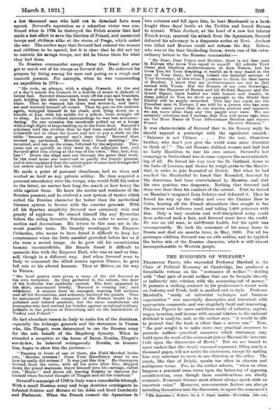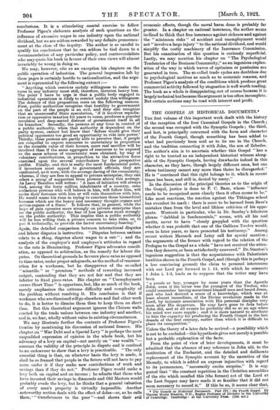THE ECONOMICS OF WELFARE.* PROFESSOR Plow; who succeeded Professor Marshall
in the Chair of Political Economy at Cambridge, has produced a formidable volume on the " economics of welfare "—dealing with " that part of social welfare that can be brought directly or indirectly into relation with the measuring-rod of money." It presents a striking ,continst to his predecessor's recent work on Industry and Trade, both in method and in style. Professor Marshall's " study of industrial technique and business organization " was essentially descriptive and historical, with appropriate comments, and was singularly lucid and interesting. Professor Pigou's far more ambitious study of industry, capital, wages, taxation, and income with special relation to the national dividend is analytic, and, as the author says, " it would be idle to pretend that the book is other than a severe one." Now, " the goal sought is to make more easy practical measures to promote welfare—practic,a1 measures which statesmen may build upon the work of the economist just as Marconi the inventor Inilt upon the discoveries of Hertz." But we are bound to warn readers that this closely reasoned argument, filling nearly a thousand pages, will not assist the statesman, except by making him very reluctant to move in one direction or the other. The oracle, like that of Delphi, speaks too often in obscure and ambiguous terms. For, as the author admits. " when as often happens a practical Issue turns upon the balancing of opposing considerations, even though these considerations are wholly economic, Economic Science must almost always speak with an uncertain voice." Moreover,, non-economic factors are always intruding themselves into the discussion, to upset the economist's * The Boanoatice o Welfare. By A. G. Riau. Ienslen [see. net.)
conclusions. It is a stimulating mental exercise to follow Professor Pigou's elaborate analysis of such questions as the influence of excessive wages in one industry upon the national dividend, but we are seldom rewarded by any definite pronounce- ment at the close of the inquiry. The author is so careful to qualify his conclusions that he can seldom be tied down to a recommendation of any particular policy, and controversialists who may quote his book in favour of their own views will almost invariably be wrong in doing so.
We may, however, cite as an exception his chapters on the public operation of industries. The general impression left by
these pages is certainly hostile to nationalization, and the argu- ment is represented by the following extract:— "Anything which restricts unduly willingness to make ven- tures in any industry must still, therefore, threaten heavy loss. The point I have to urge is that a public body engaged in industrial operations is likely to restrict unduly this willingness. The defence of this proposition rests on the following reasons. First, public authorities recognize that hostility to government on the part of the people is an evil, and they also recognize that an unsuccessful State speculation, ' if it involves repudia- tion or oppressive taxation for years to come, produces a popular revulsion and deep-seated distrust of government itself in all its branches.' Secondly, the persons at any time in control of a public, authority, when that authority is dependent on the party system, cannot but know that ' failure would give their political opponents too good an opportunity to ride into power.' Thirdly, these persons are partly opportunity to perceive that, if people are compelled to expose resources to uncertainty in proportion to the rateable value of their houses, more real sacrifice will be involved than if the same aggregate of resources to be exposed to the same scheme of uncertainty were obtained, by way of voluntary contributions, in proportion to the attractive force exercised upon the several contributors by the prospective profits. Finally, and this is really the most fundamental point, if inventors must appeal to government officials, they are confronted, as it were, with the average daring of the community, whereas, if they are free to appeal to private enterprise, they can select a group of supporters from persons above this average. As Leroy Beaulieu well writes : ' A man of initiative will always find, among the forty million inhabitants of a country, some audacious persons who will believe in him, will follow him, will make their fortunes with him or will ruin themselves with him. He would waste his time in trying to convince those hierarchical bureaus which are the heavy and necessary thought-organs and action-organs of a State.' It follows that, in general, while the hope of gain operates more strongly on private enterprise than on the public authority, the fear of loss operates more strongly on the public authority. This implies that a public authority will be less willing than a private concern to take risks, or, to put it technically, to provide the factor uncertainty-bearing."
Again, the detailed comparison between international disputes and labour disputes is instructive. " Disputes between nations relate to a thing, disputes about wages to a rate " ; and the analysis of the employer's and employee's attitudes in regard
to the rate is illuminating. Professor Pigou advocates concili- ation, as opposed to arbitration, as the remedy for labour dis- putes. On theoretical grounds he favours piece-rates as opposed to time-rates, under proper safeguards, as the method of remuner- ation for a workman, but he disapproves of the so-called
" scientific " or " premium " methods of rewarding increased output, contending that they are not fair and that they are inferior to fixed piece-rates. His chapter on " Unemployment versus Short Time" is opportune, but, bite so much of the book, merely emphasizes the extreme difficulty and complexity of the problem without resolving it. His conclusion is that if
workmen who are dismissed will go elsewhere and find other work to do, it is better to dismiss them than to keep them on short time. But this theoretical argument ignores the Chinese walls erected by the trade unions between one industry and another, and is, we fear, wholly without value in existing circumstances. We may illustrate further the contents of Professor Pigou's treatise by mentioning his discussion of national finance. His chapter on " War Debt and a Special Levy " is perhaps the most unqualified expression of opinion in the whole book, but his
advocacy of a levy on capital—not merely on " war wealth "- assumes the validity of the principle in dispute and is confined to an endeavour to show that a levy is practicable. " The only
essential thing is that, on whatever basis the levy is made, it shall be so framed that people in the future will not have to pay more under it if they make new contributions of work and savings than if they do not." Professor Pigou would make a levy both on capital and on income ; he admits that those who have invested their savings in diamonds and Old Masters would probably evade the levy, but he thinks that a general valuation of every man's property is virtually impossible. Another • noteworthy section deals with the effect of doles—or, as he calls them, • " transferences to the poor "—and shows their evil
economic effects, though the moral harm done is probably far greater. In a chapter on national insurance, the author seems inclined to think that free insurance against sickness and against the " minimum risks " of accident and unemployment would not " involve a large injury " to the national dividend, and would simplify the costly machinery of the Insurance Commission. But his examination of this question is curiously superficial. Lastly, we may mention his chapter on " The Psychological Tendencies of the Business Community," as an ingenious explan- ation of the way in which waves of optimism or pessimism are generated in turn. The so-called trade cycles are doubtless due to psychological motives as much as to economic reasons, and Professor Pigou's analysis of the conditions which produce great commercial activity followed by stagnation is well worth reading. The book as a whole is disappointing, not of course because it is largelytechnical butbecausc theargument is too often incomplete. But certain sections may be read with interest and profit.



































 Previous page
Previous page